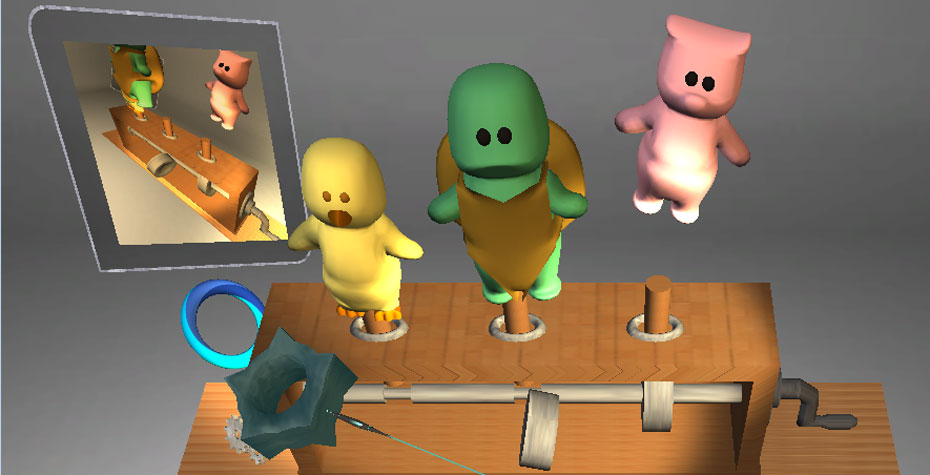Media Arts and Sciences Major Investigates Field of Technology That Creates Sensations of Touch

Haptic interaction, the physical experience of a virtual interaction, is a growing field of interest for programmers and user interface designers. Media arts and sciences major Heather Petrow DS’14 explored this fascinating field in her senior thesis entitled “Haptic Interaction: Using 3D Stereoscopic Display Technology.”
Petrow became interested in the media arts and sciences department after encouragement from her dean, Susan Cohen. She found an influential mentor in Orit Shaer, Claire Booth Luce Assistant Professor of Computer Science, who introduced Petrow to the Human Computer Interaction Lab (HCI-Lab). With Shaer, Petrow explored the lab through a variety of different projects, supported by the Barbara Peterson Ruhlman '54 Fund for Interdisciplinary Studies. Shaer became Petrow's thesis advisor during her senior year. “I feel so fortunate to have had amazing mentors and advisers who helped me to direct my interests and encouraged me to try things I never dreamed I was capable of,” Petrow says.
For her thesis topic, Petrow knew she wanted to explore new technology and understand some of the possibilities of new virtual interfaces. She recounts, “From a broad perspective, I wanted to better understand how we interact with machines and how we can design interfaces that are more intuitive and more connected to the human experience. I was inspired by notions of what the future of technology will be like and how it will influence our lives.” Petrow considered researching gesture interaction (what allows consoles like the Microsoft Kinect to read human gestures) but then became interested in the possibilities of touching and feeling in a virtual interface. “I wondered how that could act as an immersion cue to greater simulate actual human interaction, and whether and how that could influence the user experience.”
This led her to haptics. Haptics is the field of technology that creates sensations of touch, for instance, by using vibrations. Many people experience haptic feedback in vibrating hand-held technology, like a buzzing Wii remote, or with touch screens on tablets and smartphones. “As technology advances, I think greater use of the range of human sense, such as haptic input, will become a more ubiquitous feature of interface design,” says Petrow. Research in haptic feedback can lead to better understanding of practical applications. Combining this understanding with smarter, more intuitive design can make haptic interaction “more predominant and useful in future applications, from tools for science and medicine to the way we experience music and images,” she explains.
In her thesis, Petrow specifically researched how being able to use the sense of touch affected interaction in 3D virtual space. “Three-D stereoscopic displays render images with simulated depth by providing offset images to each eye, like in 3D movies,” she explains. She used technologies like zSpace, a cutting-edge system employing stereo display with polarized glasses and a stylus, to develop an application with simple geometric objects that sent haptic feedback, or vibrations, to the stylus when the objects collided. She also programmed haptic feedback into an existing HCI lab statistical application, and designed another new application for building simple virtual machines with animated models. In each of these applications, Petrow sought to better understand whether and how haptic feedback could be used in conjunction with 3D stereoscopic vision in various applications.
She describes the thesis experience as “full of surprises.” “I was surprised at how research results can continually elucidate new and unconsidered questions and ideas. Another surprise was how much the development process would inform my learning in addition to the research. I developed a much greater appreciation for the complexity of interaction design.” Having graduated, Petrow works for a socially-minded investment company and continues to pursue her interest in user interfaces. Looking back, she reflects, “Overall, I was surprised by how much I was able to learn and accomplish over the course of a year. The experience exposed me to many new challenges, and pushed me further than I thought possible.”
Taking a cue from the Huffington Post’s College Thesis project, The Daily Shot has been running its own series to feature theses and other projects by Wellesley seniors, exemplifying (just a portion of) the range, creativity, and scholarship of the class of 2014.
